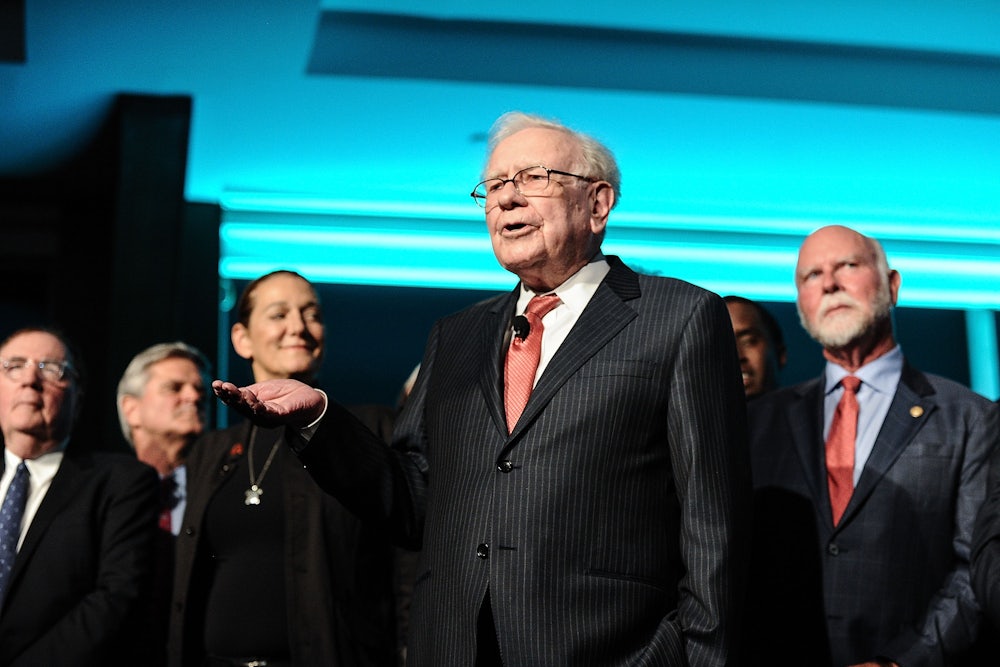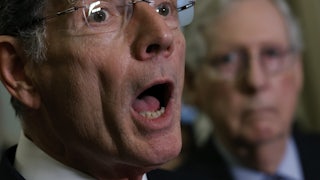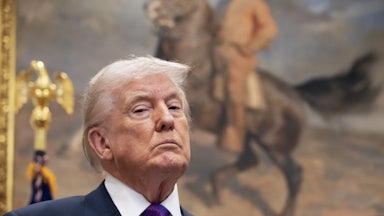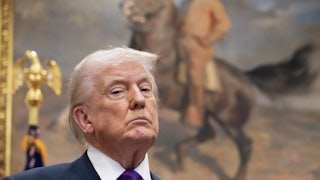President Joe Biden will present his budget Thursday at what Reuters calls a “campaign-style event” in a Philadelphia union hall. The budget will include, The Wall Street Journal reports, higher taxes on “wealthier people and corporations.” I presume these imposts will include the quadrupling of the 1 percent excise tax on stock buybacks that Biden proposed in his State of the Union address.
The 1 percent excise tax is new. It was tucked into Chapter 37 of the Inflation Reduction Act, or IRA, last summer as a sort of consolation prize after Senator Kyrsten Sinema, Democrat of Arizona, refused to support the IRA if it eliminated the carried interest loophole or a corporate tax hike. Democrats were still fulminating (legitimately) about that when Biden signed the IRA into law, so the press mostly ignored the buyback tax’s creation.
I did not. I called the tax “long overdue” in August and enthused further when Biden proposed kicking it up to 4 percent in February. I called it “one of the very best things Biden has done.” I still believe that. But the cheering section I expected to form behind me never materialized. In fact, if anything, the opposite happened. I am not (I hope) averse to taking a lonely stand, but usually when I do it, I know I’m doing it. This time, the backlash against Biden’s buyback tax took me by surprise.
Not all of the backlash, of course. I knew The Wall Street Journal editorial page would run op-eds with headlines like “The Virtues of Stock Buybacks” and “Biden’s Stock Buyback Tax Would Hit the Little Guy.” It did not astonish me that National Review would call the buyback tax an “inane” idea promoted by “Democratic class-warfare demagogues” or that George Will would write of the tax’s supporters, “Forgive them because they cannot help themselves.” There’s little point in being the Journal edit page or NR or George Will if you tolerate taxes on capital.
But the backlash didn’t stop there; the Journal’s news side, for which I have great respect (and where I was employed for six years in the 1990s), questioned the wisdom of the buyback tax too. For example, a March 2 piece by Jennifer Williams-Alvarez suggested that if the tax is quadrupled then businesses will just (duh!) give stockholders more dividends. James Surowiecki, a financial journalist for whom I have great respect, made that same point in The Atlantic (“Stop Demonizing Stock Buybacks”).
But Harvard law professors Jesse M. Fried and Charles C.Y. Wang, who wrote the Journal op-ed calling buybacks virtuous, argued the opposite. “Executives will be reluctant to make this switch, partly because dividends (unlike repurchases) reduce the value of their stock options,” they wrote.
Also, dividends are taxed, sometimes as income and sometimes as capital gains, at rates much higher than the buyback tax’s 1 percent or prospective 4 percent. If corporations were to overlook that disparity, it would only be because, unlike the buyback tax, dividend taxes are paid by shareholders, not the company.
Warren Buffett, the “sage of Omaha,” bashed the buyback tax in this year’s annual letter to Berkshire Hathaway shareholders. Buffett is an intelligent and public-spirited man whose views on taxation are usually worth listening to. It was Buffett, for instance, who noted back in 2011 that he shouldn’t be paying a lower tax rate than anybody else in his office, and proposed creating new tax brackets for people earning in excess of $1 million and $10 million. Good ideas! But Buffett didn’t sound like a sage when he denounced the buyback tax. He sounded like a harrumphing billionaire:
When you are told that all [stock] repurchases are harmful to shareholders or to the country, or particularly beneficial to CEOs, you are listening either to an economic illiterate or a silver-tongued demagogue (characters that are not mutually exclusive).
I’m perfectly willing to accept Buffett’s proposition that not all stock repurchases harm shareholders. Well, of course. Buybacks raise the value of shareholders’ stock, so they’re probably going to help shareholders. In a piece about Buffett’s criticisms, The New York Times’ Dealbook echoed this point. But it isn’t really shareholders I think about when I criticize buybacks; it’s employees, who would benefit from more of that excess cash going to them. Buffett didn’t even mention employees in his letter (though perhaps that’s what he meant by “the country”).
Fried and Wang argue that the distinction between stockholder and employee is a false one. That’s because “most repurchased shares either go to employees, who later sell to investors, or are acquired to reduce equity dilution after employees have sold stock.” They calculate that “85 percent of this value flows to employees below the top executive level.” But how far below? I’m guessing most of the value flowed to the approximate level of executive vice president. That higher-ups want buybacks to increase the value of their compensation packages does not demonstrate that the average worker (or, by extension, the company) will benefit.
Let’s talk about that sold-off stock. In 2018, Securities and Exchange Commissioner Robert J. Jackson Jr., whom President Donald Trump appointed to fill a Democratic seat, conducted a study of 385 buybacks over the previous 15 months. In half of them, Jackson said, “at least one executive sold shares in the month following the buyback announcement.” During the eight days following the announcement, “executives on average sell more than $500,000 worth of stock each day.” That isn’t insider trading, because the information being traded on is public (though I’ll bet there’s plenty of insider trading too). But it sure sounds like self-dealing. And as I’ve noted before, the danger of self-dealing is precisely why the 1934 Securities Exchange Act was, until 1982, interpreted to prohibit most buybacks. President Ronald Reagan’s SEC chairman, John Shad, effectively repealed that prohibition and began the buyback bacchanal.
Unmentioned in every recent defense I’ve seen of stock buybacks is the phenomenon of “leveraged buybacks,” wherein companies load up with debt in order to buy back stock. I was beginning to think I’d imagined it, but you can read all about it in this report by the nonpartisan Congressional Research Service. Estimates for what percentage of total buybacks are leveraged vary, but Yardeni Research, a very mainstream firm, says it’s 56 percent.
If most stock buybacks really are leveraged, that calls into question the standard narrative that buybacks are necessary when a corporation is sitting on too much cash. But let’s suppose that narrative is true. The danger buybacks avert is that with all that profit generating all that cash, the CEO will do something stupid like buy a motion picture studio. Maybe you lie awake nights worrying about this. I do not.
Neither does the shareholder advocate Nell Minow. “This is literally why we pay you the big bucks,” she told me (pretending I was a corporate chairman). “To have a better idea of what to do with the money.” Minow elaborated a few years ago in the HuffPost:
We invest in these companies because we believe in their business plans, and if they cannot find a use for the capital, they owe us an explanation that has to go beyond financial engineering tied to quarterly numbers.
What Minow is saying is that even shareholders are disserved by buybacks. Their expectation is that their investment will create jobs and foster innovation. (That should be their expectation, anyway.) And if stock value is threatened down the road by the accumulation of unnecessary debt, then any stockholder investing for the long term is getting played for a sucker.
Maybe a 4 percent stock on buybacks can change this (for the record, Minow is skeptical because “corporations don’t care about taxes”). Maybe it can’t. But I’m at a loss to explain why so many are rushing to defend stock buybacks. It seems to me they are at best worthless and at worst actively destructive.






